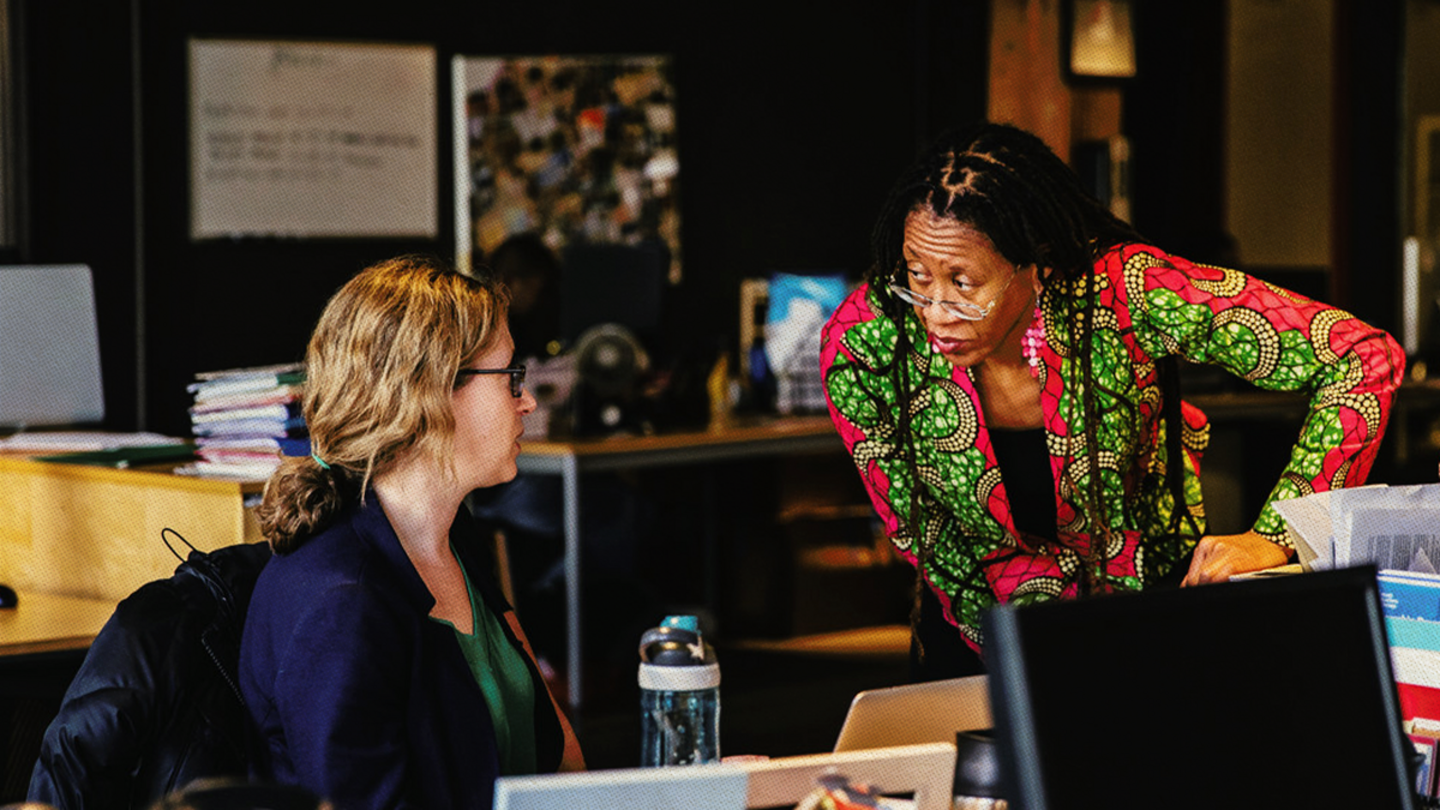The workforce is evolving. Especially post-COVID, traditional working structures — be it 9-5 schedules or in-office work — are no longer necessarily the norm. Rather than requiring employees to adapt to the company’s long-held working structures, many workplaces are now considering how they can best fit employees.
When Moja Chatman lost his position as a manager in the transport logistics field in 2020, he knew he didn’t want to go back to that industry. But he also didn’t think there was a place readily available for him in the IT world, where he had long aspired to work.
“I knew I did not want to go back to that industry because the only thing that industry did was burn you out,” he said. “There was no work-life balance. I knew I didn't want to go back, and at that point, I decided to do a career pivot.”
Working with Per Scholas, an organization focused on helping employees develop tech skills and advance their careers, Chatman learned to be a data analyst and transitioned into that role at Barclays Bank, which partners with Per Scholas to find talent. But even now, after landing his role there, Chatman is firm in asserting that his professional journey is far from over. He is continuing to pursue new credentials and certifications in areas that interest him most — which he’s able to do because of the flexibility Barclays offers.
By giving people like Chatman opportunities to explore meaningful work that suits their talents and interests, the bank is cultivating a corporate environment that serves its bottom line as well as its employees' needs.
“It’s one way they can widen their talent pool,” said Brittany Murrey, executive vice president of talent solutions at Per Scholas. “They can fill their job openings more quickly while also ensuring their teams have the right skills to succeed.”
Barclays is just one example of an employer thinking differently about its policies, making them less one-size-fits-all and more tailored to employees’ unique needs and circumstances. From flexible work-from-home arrangements to upskilling programs to in-house child care options, employers are increasingly meeting individuals where they are instead of the other way around. Doing so is a win-win: Employees feel empowered to reach their full potential on the job, and employers increasingly reap the benefits.
Out: employees molding to the office. In: offices that recognize each individual’s needs.
Through programs like its partnership with Per Scholas, Barclays is demonstrating how companies can foster a culture of growth — proving to employees that when they land a role at the bank, their professional and personal journeys are just beginning.
Besides its collaboration with Per Scholas, Barclays offers employees benefits that empower them to grow and learn over time. The bank supports employees in pursuing professional certifications. It works with them to improve their mental health via mindfulness. It allows employees to design flexible working arrangements and even has specific professional pathways that help veterans transfer their skills into roles at the company.
These are just a few of many policies that can be reexamined to make workplaces more adaptable to employees’ needs. Bright Horizons helps companies set up employer-sponsored, on-site child care — noting that doing so can improve employee productivity and retention. Virtira works with employers as they reconsider the merits of long-held workforce norms. For instance, it advocates for prioritizing open, consistent communication practices rather than assuming that required in-office work will improve cross-team communication.
That’s not to say that working in the office or adhering to a traditional schedule is always the wrong choice. Some companies may find that these more traditional structures do indeed work best for both employees and employers. What’s key is for employers to shift from the assumption that employees are responsible for adapting to the company’s policies and start giving more autonomy and decision-making power to employees and managers. That change can make all the difference in how empowered a company’s workforce feels, and in turn, how driven, innovative, and dedicated they feel in their roles.
Every workplace, role, and team is distinct. When employers implement flexible working policies — whether that's working location, hours, or other methods — they place more trust in their employees and give them more agency to better serve their organizations.
Sign up for Stand Together's Rethinking Work & Learning newsletter to get the latest stories, ideas, and trends on the future of employment.
For organizations that adapt to their employees, the results are real
So what does it look like when employers take a more personalized and intentional look at their policies? What is required of employees?
Providing options for employees naturally widens the pool of people able to take on a role. This, in turn, increases the variety of experiences, talents, and skill sets within the company, which can accelerate the amount of drive, creativity, and overall success an organization sees.
Murrey pointed out that traditional workplace arrangements can make it difficult for potential employees to apply — automatically disqualifying many individuals, despite the unique and valuable experiences they may have to offer.
“By removing barriers, employers are able to more readily diversify their workforce,” she said. “[For instance,] applicant tracking systems now make it challenging for a mother who maybe was staying at home and raising her children for 18 years who is now trying to get back in the workforce. You think about people who might be refugees … individuals who are over 40 years old that are looking to start new careers, after they've been in the workforce for 20 years. I think anyone that is willing, able, and eager to have a career in tech and is passionate deserves an opportunity to access that career pathway.”
For companies that do broaden workplace flexibility, the benefits are very real. Implementing policies that welcome a more diverse array of personal and professional experiences often results in “a better quality product, higher productivity, and a workforce as diverse as the customers it serves,” Murrey said.
According to Harvard Business Review, aligning the options of flexible work arrangements with employees’ particular strengths and needs can result in “radical” increases in productivity, creativity, and profitability.
“These diverse perspectives and backgrounds have real tangible impacts on the workplace and even on for-profit companies’ abilities to continue to expand on their own goals that they have set for themselves around their earnings,” Murrey said.
More productivity and purpose for all
Chatman asserts that despite how fulfilled he is at Barclays, his current role isn’t his dream job — that’s still on the horizon. But because of Barclays’ support, reaching that pinnacle is well within his reach.
“This is far and away the best position I’ve been in during my professional career,” he said. “My dream job is when I’m at the top of the mountain. I’m looking to go higher, and from my perspective, that will never stop.”
Encouraged by Barclays’ flexibility and professional growth mindset, Chatman continues to explore and develop new passions through Per Scholas. The organization routinely expands its curriculum to encompass new developments in tech, empowering workers to grow and evolve continually.
“I’m like a kid in a candy store,” he said. “I’m looking to see what [Per Scholas] offers, and I match it against what’s prominent in the world today, and that’s what I pursue in that particular time.”
This enthusiasm and drive from a motivated employee will undoubtedly benefit Barclays. By considering its employees’ needs, experiences, and strengths first, the company is fostering a healthier, more productive workforce.
More importantly, the organization is creating a working environment in which each worker is recognized, uplifted, and supported for their unique backgrounds and strengths, helping them achieve a higher sense of fulfillment and purpose on the job.
“I already had the experience,” Chatman said. “I already had the passion. I already had the desire. It was just a matter of helping me refine those.”
***
The Stand Together community partners with changemakers who are tackling the root causes of America’s biggest problems.
Learn more about Stand Together’s efforts to transform the future of work and explore ways you can partner with us.

Here’s how to bridge the disconnect between employers and employees.

Lessons learned from Colorado.

Could a program built to develop music talent change the way we think about education?

How to help the talent of today fill the jobs of tomorrow.
